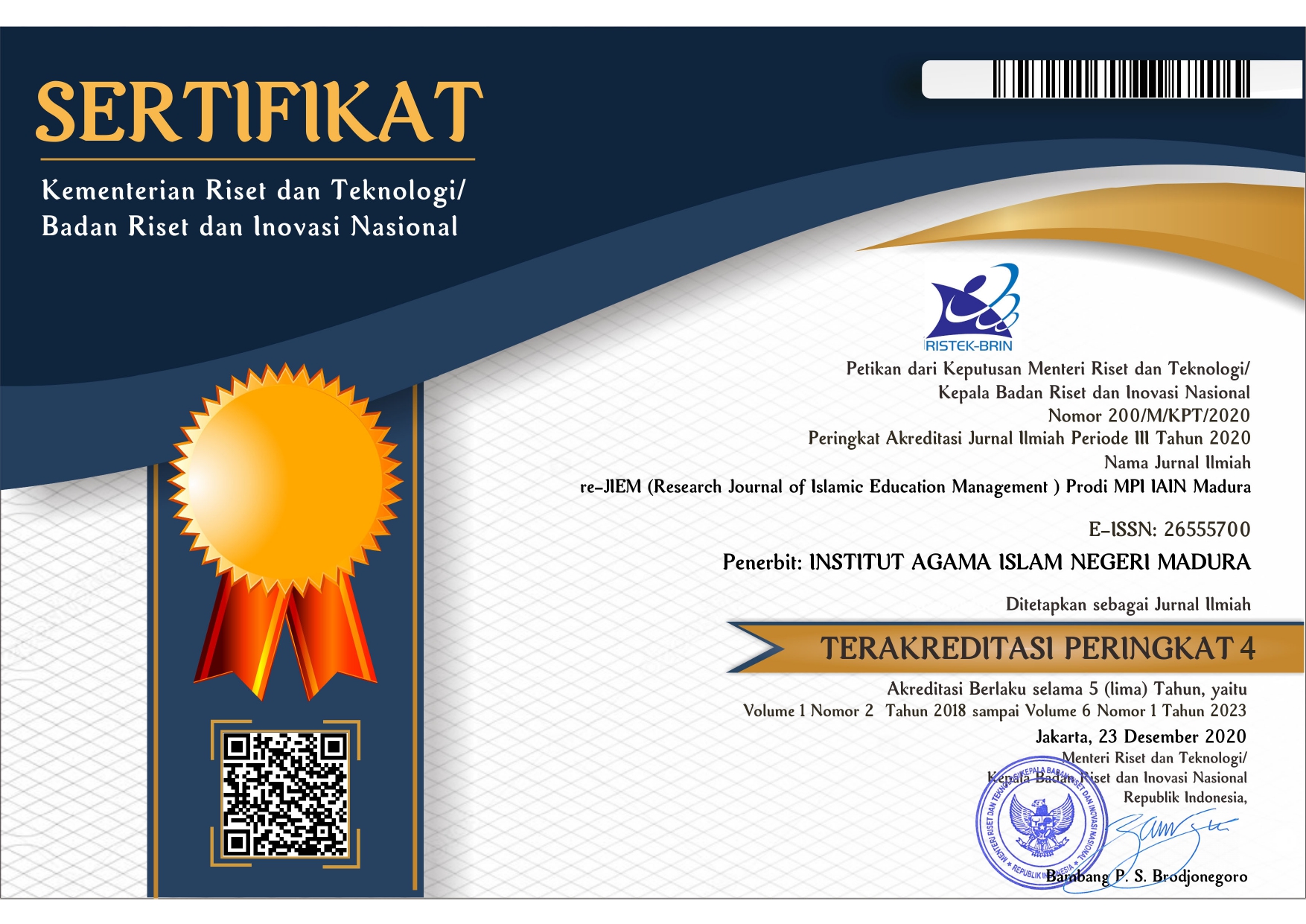STRATEGI KEPALA SEKOLAH MEGIMPLEMENTASIKAN KURIKULUM CAMBRIDGE UNTUK MEMBENTUK SISWA BERDAYA SAING INTERNASIONAL DI SEKOLAH MENENGAH PERTAMA THURSINA INTERNASIONAL ISLAMIC BOARDING SCHOOL MALANG
 Abstract views: 496
,
Abstract views: 496
,
 PDF downloads: 584
PDF downloads: 584
Abstract
This research aims to describe the strategy of having a master's in implementing the Cambridge curriculum to shep student’s potential to compete globally at SMP Thursina Internasional Islamic Boarding School Malang. The focuses of the study involve (1) the characteristics of students’ potential for international competitions. (2) the strategy from hand master in implementing Cambridge curriculum to establish students in competing Globally. (3) the model of strategy from the headmaster in implementing the Cambridge curriculum to establish students to compete Globally. The findings show that 1) the characteristics of students with good potential to compete Globally can be observed from the foreign language proficiency, academic achievement for both national and international levels, and kind of Extracurricular program provided. (2) strategy in implementing Cambridge curriculum through the application of management function which includes: planning, organization, implementation, and Evaluation. 3) model of strategy from headmaster in implementing Cambridge curriculum implementation and overseas program, Quality Control, and human resource research.
Downloads
References
Ansar, Muhammad. Kurikulum Fondasi Desain Dan Pengembangan. Jakarta: Perdana Media Group, 2015.
Buna’i. Perencanaan Pembelajaran PAI. Surabaya: Pena Salsabila, 2013.
Elfrida, Domina, Heru Santosa, and Totok Amin Soefijanto. “Pengaruh Kompetensi Guru Dan Implementasi Kurikulum Asing Terhadap Kinerja Guru Di Sekolah Internasional Jakarta Utara.” Tadbir : Jurnal Studi Manajemen Pendidikan 4, no. 1 (2020): 53. https://doi.org/10.29240/jsmp.v4i1.1358.
Fatihurrahman. Pengantar Pendidikan. Jakarta: Prestasi Pustaka, 2012.
Hamdani. Strategi Belajar Mengajar. Bandung: Pustaka Setia, 2011.
Jaenullah, Sudadi, Yusron Masduki, and Rafita Purnama Sari. “Mengembangkan Minat Dan Bakat Di SMK Negeri 1 Kebumen.” Jurnal UM Palembang 4 (2021): 7–17.
Kadir, Syaiful. Kepemimpinan Kependidikan Dan Budaya Mutu. Yogyakarta: Zahir Publishing, 2017.
Khoiri, Ahmad, Mulyadi Mulyadi, and Triyo Supriyatno. “Strategi Kepala Madrasah Dalam Mengimplementasikan Program Tahfidzul Qur’an Di Madrasah Aliyah Negeri 1 Sampang Dan Madrasah Aliyah Al-Ittihad Al-Islami Camplong Sampang.” Re-JIEM (Research Journal of Islamic Education Management) 3, no. 2 (2020): 163–75. https://doi.org/10.19105/re-jiem.v3i2.4190.
Muh. Hambali, and Mu’alimin. Manajemen Pendidikan Islam Kontemporer Strategi Pengelolaan Dan Pemasaran Pendidikan Islam. Yogyakarta: IRCiSoD, 2020.
Mulyasa, E. Implementasi KTSP; Kemandirian Guru Dan Kepala Sekolah. Jakarta: Bumi Aksara, 2009.
Nasution. Asas-Asas Kurikulum. Jakarta: Bumi Aksara, 1994.
Olaleye, Florence Oluremi. “Improving Teacher Performance Competency Through Effective Human Resource Practices in Ekiti State Secondary Schools.” Singaporean Journal of Business , Economics and Management Studies 1, no. 11 (2013): 125–32. https://doi.org/10.12816/0003819.
Pusat, Pemerintah. Undang-undang (UU) tentang Sistem Pendidikan Nasional, JDIH BPK RI § (2003). https://peraturan.bpk.go.id/Home/Details/43920/uu-no-20-tahun-2003.
Soetjipto, and Raflis Kosasi. Profesi Keguruan. Jakarta: Rineka Cipta, 2004.
Sugiana, Aset. “Proses Pengembangan Organisasi Kurikulum Di Indonesia.” EL-HIKMAH: Jurnal Kajian Dan Penelitian Pendidikan Islam 12, no. 1 (2018): 91–103. https://doi.org/10.20414/elhikmah.v12i1.229.
Suryani, Cut. “Implementasi Supervisi Pendidikan Dalam Meningkatkan Proses Pembelajaran Di Min Sukadamai Kota Banda Aceh.” Jurnal Ilmiah Didaktika 16, no. 1 (2015): 23. https://doi.org/10.22373/jid.v16i1.585.
Copyright (c) 2022 Mila, Basri Zaen , Muh. Hambali

This work is licensed under a Creative Commons Attribution-ShareAlike 4.0 International License.
Authors who publish with this journal agree to the following terms:
Authors retain copyright and grant the journal the right of first publication with the work simultaneously licensed under a Creative Commons Attribution-ShareAlike 4.0 International License that allows others to copy and redistribute the material in any medium or format with an acknowledgment of the work's authorship and initial publication in this journal and also allows them to remix, transform, and build upon the material for any purpose, even commercially, with contributions under the same license as the original.
Authors are able to enter into separate, additional contractual arrangements for the non-exclusive distribution of the journal's published version of the work (e.g., post it to an institutional repository or publish it in a book), with an acknowledgment of its initial publication in this journal.
Authors are permitted and encouraged to post their work online (e.g., in institutional repositories or on their website) prior to and during the submission process, as it can lead to productive exchanges, as well as earlier and greater citation of published work.




















